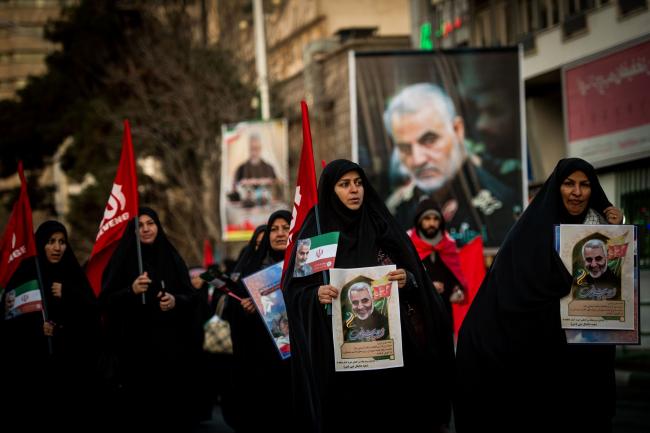(Bloomberg) -- Follow Bloomberg on Telegram for all the investment news and analysis you need.
Iran fired a series of rockets at two U.S.-Iraqi airbases early Wednesday morning Baghdad time, the Pentagon said, in the first Iranian response to the killing of General Qassem Soleimani by American forces last week.
The Islamic Revolutionary Guard Corps earlier claimed responsibility for the barrage, which the Pentagon said was launched from Iran and targeted the Ayn al-Asad base in western Iraq and another facility in Erbil. It wasn’t immediately clear whether there were casualties or major damage from the attacks.
“We are aware of the reports of attacks on U.S. facilities in Iraq,” White House Press Secretary Stephanie Grisham said in a statement. “The president has been briefed and is monitoring the situation closely and consulting with his national security team.” Defense Secretary Mark Esper and Secretary of State Michael Pompeo were at the White House, CNN reported.
The attack roiled financial markets anew, sending futures on the S&P 500 Index down as much as 1.5%. Japan’s Topix Index tumbled 2.2% as of 9:32 a.m. in Tokyo. Haven assets soared, with gold prices punching through $1,600 an ounce for the first time since 2013 and West Texas Intermediate crude jumping more than 4%.
“A missile attack from Iran against U.S. forces is a serious escalation,” said Michael Singh of the Washington Institute for Near East Policy and a former senior director for Middle East affairs under President George W. Bush. Such an attack “cannot be regarded as merely symbolic or face-saving regardless of its results,” he added.
The scope of the U.S. response could depend heavily on the damage and whether any Americans were killed or injured in the strikes. President Donald Trump has shown restraint in previous attacks in the region blamed on Iran that didn’t kill any U.S. citizens, but Iran’s quick claim of responsibility for the strike and the targeting of U.S. military outposts make some sort of retaliation more likely.
How U.S.-Iran Tensions Heated Up, Then Boiled Over: QuickTake
The Defense Department said the bases had already been on high alert given soaring tensions over the past two weeks. Iran is believed to have the region’s largest stockpile of short-range ballistic missiles and a large number of American military and diplomatic facilities in the region were seen as potential targets for reprisals.
“As we evaluate the situation and our response, we will take all necessary measures to protect and defend U.S. personnel, partners, and allies in the region,” according to a Pentagon statement.
House Speaker Nancy Pelosi was in a closed-door meeting with fellow Democrats when she was handed a note about the attack as the lawmakers were discussing Trump’s impeachment. She left the room after telling her colleagues to “pray,” Representative Debbie Dingell said.
The Ayn al-Asad base is a key U.S. facility in the country. Vice President Mike Pence had visited it late last year and President Donald Trump was there in December 2018.
The Islamic Revolutionary Guard Corps said that further responses will be on the way in response to the Soleimani strike last week. It called the attack the start of its “Martyr Soleimani” operation, in honor of a leader many Iranians considered a national hero for his exploits in conflicts from Syria to Yemen.
“The IRGC announces to the great Satan the U.S. that any responses will be met with much more pain and destruction,” the IRGC said in a statement on its Sepah News website.
At Soleimani’s funeral on Tuesday, Hossein Salami, the leader of Iran’s Revolutionary Guard, threatened to “set ablaze” places supported by the U.S., the Associated Press reported. The general’s burial was postponed after dozens of mourners died in a stampede.
Iran is assessing 13 scenarios for retaliation, Ali Shamkhani, head of Iran’s national security council, was cited as saying by the semi-official Fars news agency. “The entirety of the resistance forces will retaliate” for Soleimani’s killing, he says. The Council later denied he had spoken to the media, Iran’s state news agency reported.
The U.S. had vowed a quick and overwhelming response to any Iranian attacks. Over the past week, the Pentagon deployed about 3,500 soldiers from the 82nd Airborne to Kuwait and another three Navy ships with about 2,200 Marines to the Persian Gulf region.
Iranian-only targets for the U.S. include Islamic Revolutionary Guard Corps navy vessels in the Persian Gulf, nuclear facilities, military bases, ports and oil installations, according to a Tuesday report by the Congressional Research Service. Another option: Iranian proxies.
U.S. officials say they were justified in targeting Soleimani, who was accused of having helped Iraqi insurgents target American troops with improvised explosive devices following the U.S. invasion in 2003.
Drone Strike
Already-high tensions between the U.S. and Iran soared following a Dec. 27 rocket assault on an Iraqi base. It killed an American contractor and wounded several other U.S. personnel. The U.S. put the blame on Kataib Hezbollah, an Iraqi militia closely associated with Iran.
On Dec. 29, the U.S. conducted air strikes on five bases in Iraq and Syria used by Kataib Hezbollah. Two days later, dozens of Iraqi militiamen and their supporters stormed the U.S. embassy complex in Baghdad. The U.S. responded with the drone strike on Soleimani on Jan. 2.
Esper said Tuesday that attacks planned by Soleimani, who headed the Revolutionary Guard’s Quds Force, were “days away” when the U.S. struck.
“We got it right,” Pompeo told reporters on Tuesday. “And the president had an entirely legal, appropriate, and a basis, as well as a decision that fit perfectly within our strategy and how to counter the threat of malign activity from Iran more broadly.”
(Adds analyst comment in fifth paragraph and Pelosi’s reaction in)
